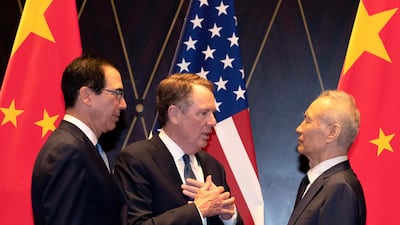US and Chinese negotiators stressed their commitment to the "phase one" trade deal in a phone call where both sides said they had seen progress, even as relations between the world’s two largest economies deteriorate in many areas.
The two countries discussed steps China has taken, including ensuring greater protection for intellectual property rights and removing hindrances to American companies in financial services and agriculture, US Trade Representative Robert Lighthizer said.
They agreed to create conditions to push the deal forward, according to China’s Ministry of Commerce.
Resolving the trade war between the US and China has become a rare area of co-operation as the relationship sours on a number of other fronts ranging from technology security to Hong Kong and the pandemic response.
Yet, Beijing is far behind where it needs to be to meet its promises to increase purchases of agricultural, energy and manufactured goods from the US.
China would need to buy about $130 billion (Dh477.4bn) in the second half of this year to comply with the original terms of the agreement signed in January, in which it agreed to purchase an additional $200bn of American goods and services over the 2017 level by the end of 2021.
“The statement at least tells us that [the] Trump administration still treasures the trade deal,” said Raymond Yeung, greater China chief economist with Australia & New Zealand Banking Group.
“China’s buying of US agricultural and energy products is still an attractive proposition before the presidential election. This suggests that we are not really seeing a full decoupling of the two economies.”
Mr Lighthizer and Treasury Secretary Steven Mnuchin spoke to Chinese Vice Premier Liu He on Monday.
“The parties also discussed the significant increases in purchases of US products by China as well as future actions needed to implement the agreement,” the US said.
They also discussed enhancing macro-policy co-ordination, according to China's Commerce Ministry.
The call took place on the evening of the first day of the Republican National Convention, at which some speakers criticised Democratic Party nominee Joe Biden’s alleged friendliness to China.
The two sides had been expected to talk two weekends ago as part of a six-month review since the agreement, which was signed in January, took effect on February 15.
However, President Donald Trump said he cancelled those plans because he was unhappy with China over its role in the Covid-19 pandemic.
Before the talks, Bloomberg reported that China would raise the issue of Washington’s recent crackdown on businesses such as TikTok and WeChat. The topic was not mentioned in the statements from the two countries.
TikTok on Monday asked a federal judge to block the Trump administration from enacting the ban on its app.
China has made some progress on its commitments. It modified regulations to allow imports of a variety of American farm and food products, while removing foreign equity limits in insurance, securities and futures.
It also lowered other financial market barriers and gave the green light to enterprises like American Express, MasterCard and Fitch Ratings to enter its market.
US oil exports to China are set to reach a record next month, with about 19 tankers signing provisional bookings to load American crude for the Asian nation in September, according to shipping fixtures, which are subject to change.
If all of them set sail, exports could total 37 million barrels, the highest in a single month.
China’s customs department has also strengthened a crackdown on counterfeits and released quarterly reports as set out in the agreement.
The country's supreme court issued a series of work guidelines on ensuring and improving the legal enforcement of breaches of IP rights, while its patent office also published a work plan for strengthening IP protection in 2020 and 2021.
Mr Trump projected a more conciliatory tone than he did in early May, when he threatened in a Fox News interview that “if they don’t buy, we’ll terminate the deal, very simple”.
He has sounded more satisfied with Beijing’s compliance with the trade deal in recent days.

